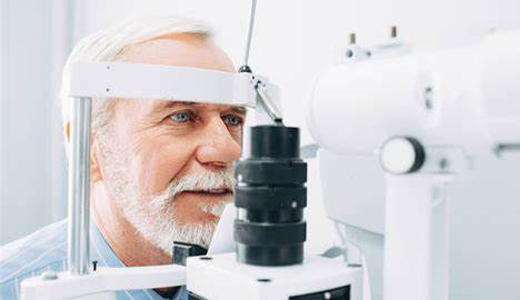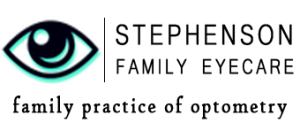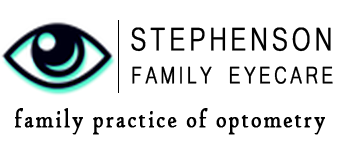Comprehensive Eye Exams with Stephenson Family Eyecare

Vision changes can occur unexpectedly, whether it is due to the onset of ocular disease or simply a natural change in visual acuity. That’s why it is important to have regularly scheduled eye exams at Stephenson Family Eyecare. When you have your comprehensive eye examination, you will know the status of your eye health immediately.
During the exam, Dr. Stephenson will check your visual acuity, assess your need for glasses or contact lenses and check for eye health conditions such as:
- Glaucoma
- Cataracts
- Macular Degeneration
- Diabetic Retinopathy
- Dry Eyes
Having regularly scheduled routine comprehensive eye exams allows for early detection of many sight threatening eye diseases and conditions when they are more amenable to treatment.
Why NOT Just a Vision Screening
There is so much more to a routine comprehensive eye exam than a refraction – “is it clearer at one or two.” Vision “screenings” offered via cell phone or on various internet sites may be inaccurate and have NO way of determining the health of your eyes. There are numerous ocular conditions and diseases that progress slowly, often undetectable to the patient, that can ultimately lead to blindness if left untreated.
During your eye exam, you can expect:
Visual acuity test
-
- Visual acuity tests use an eye chart and special equipment to gauge your visual acuity.
Screening for common eye diseases.
-
- Screening for common eye diseases. Dr. Stephenson will test for potential eye diseases such as those listed above utilizing the latest equipment and special drops, if necessary, to examine all aspects of your ocular health.
At the conclusion of your exam:
-
- Dr. Stephenson may recommend a spectacle or contact lens prescription. Our office is equipped and happy to help you with both. If an ocular health condition is diagnosed, he will discuss your results and any treatment plan required.
Eye Exam Frequently Asked Questions
How often should I visit Stephenson Family Eyecare for an eye examination?
Each patient is different. Generally, healthy adults between ages 18-40 should be seen a minimum of every two years. Dr. Stephenson recommends eye exams annually for everyone over the age of 40.
Please keep in mind that the State of Florida has laws regarding the expiration of contact lens prescriptions. A daily wear contact lens prescription is good for a maximum of two years from the date of last comprehensive exam. An extended wear prescription (a contact lens that can be slept in) is valid for one year from the date of last comprehensive exam.
Stephenson Family Eyecare has no control over these laws and cannot fill contact lens prescriptions that have expired.
When should I bring my child in for their first eye examination?
Dr. Stephenson recommends your child’s first eye examination take place between four to five years of age and annually once they start school. If a parent notices any changes before that age, such as squinting or an eye that turns in or out, they should not hesitate to call our office to schedule a comprehensive exam, regardless of their age.
Is there anything else I need to know before I go for my eye exam?
Your doctor may ask about current medications you’re taking during your eye exam. Bring a list of your medications and supplements you take to the eye exam. Bring your corrective lenses, if you have any. Your eye doctor may dilate your eyes during your exam. If your doctor is going to dilate your eyes, bring sunglasses as well.
Contact Us to Schedule an Eye Exam
To learn more about how you can schedule an eye exam, contact Stephenson Family Eye Care.

